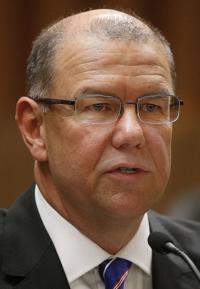Tucson’s city manager is looking for more budget cuts after too few took a buyout offer.
The buyout encouraged workers who were eligible to retire by Feb. 5 and get a bonus check for three months of pay.
When the city made the offer, there were 443 eligible employees, including 206 paid from the general fund. City Manager Michael Ortega’s goal was to get 90 of the general-fund workers to retire.
In the end, 110 employees retired, and 52 were paid from the general fund.
The goal was to save $6.2 million. The actual savings will be about $4.5 million, Ortega said.
The buyouts, along with hiring freezes and attrition, are part of Ortega’s plan to eliminate the city’s structural deficit within a few years. The projected general fund deficit for this fiscal year is $12.7 million, mainly because pension costs are growing faster than revenues. The structural deficit would grow to $42.3 million next year if the city were to do nothing.
Ortega said he is pleased with the results of the buyout program because it shrinks the city’s middle management.
Most of those who retired were higher-paid managers and supervisors. The average savings per employee who took the buyout is $86,500, he said, compared to the $69,540 average cost for all city employees, excluding commissioned officers, who were not eligible for the buyout.
The money for the bonus checks comes from what was already budgeted to pay the workers’ salaries through the end of the fiscal year had they not retired. The savings comes from eliminating those workers from future fiscal years’ budgets.
The next part of the process is to try to move jobs paid from the general fund into areas paid for by enterprise funds or special revenue funds, Ortega said.
Shifting 40 jobs that way would fill $2.8 million of the general fund gap, Ortega told the city council in a December meeting. He will update the council on that effort later this month.
But to meet his goals for reducing expenses, Ortega will have to look for more ways to cut. He has asked department heads to bring him plans. He said he won’t give departments specific goals for cuts and he won’t start with across-the-board cuts.
City programs and services could face cuts, he said.
If jobs are eliminated, there could be some retraining opportunities, he said.
The organization will look different in the near future, and it has to in order to achieve a structurally balanced budget, Ortega said.
Ortega is trying to set an example by restructuring his own office.
Assistant City Manager Ron Lewis and Deputy City Manager Martha Durkin retired and will not be replaced.
The remaining assistant city managers are Albert Elías and Joyce Garland, who was promoted to chief financial officer and assistant city manager from her previous position as budget director.
Assistant City Manager Julianne Hughes will move to the City Attorney’s Office in April.
To save $700,000 or more the city manager also cut vacant positions from his staff:
- One of seven economic development positions,
- Two of four positions in government relations
- And two executive assistant positions.
Other changes underway include combining the budget and finance offices and reorganizing the planning and development services department.




